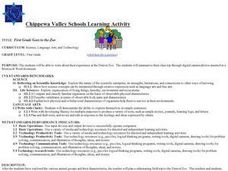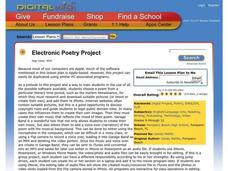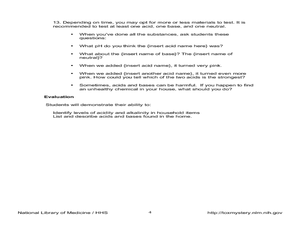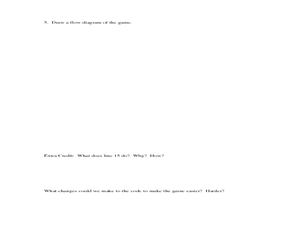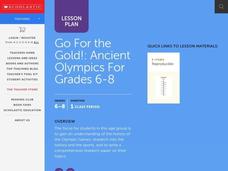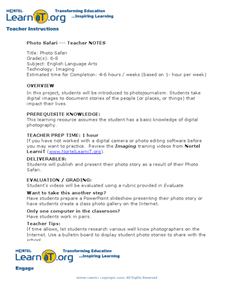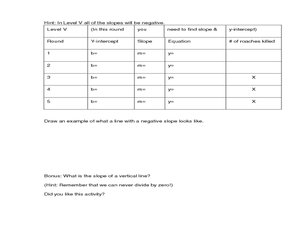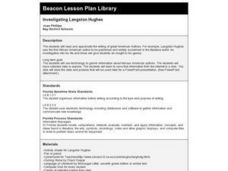Curated OER
Name That Sound
First graders match different pictures to the correct beginning and ending sounds they go with. In this sound lesson plan, 1st graders will use the computer program Kid Pix to go through a variety of pictures. They then match the picture...
Curated OER
Save the Animals!
Learners research an endangered animal and share what they learned through the use of technology. In this interdisciplinary lesson plan on animals, students conduct research on an endangered animal. Then, learners create a PowerPoint...
Curated OER
Hyperlinking Partnership
Students get involved in a unique collaboration that enhances their knowledge of architecture and design. Develop organizer resources with others. They are engulfed into a world of architects and museum specialists to facilitate the...
Curated OER
Pythagorean Theorem Spreadsheet
Studetns use a spreadsheet to organize data on the sides of a triangle. They use the Pythagorean Theorem and the If then spreadsheet function to decide whether the three sides determine a right triangle. Middle schoolers work...
Curated OER
What's the Matter?
Learners explore matter. In this matter and technology instructional activity, students locate examples of solids, liquids, and gases inside and outside the classroom, and record their findings in a graphic organizer. Learners listen...
Curated OER
American History Digital Movie
Fifth graders create a video. In this historical presentation, 5th graders watch a video clip of a dramatization of a historical event in American History. Students discuss how this video was put together. Students divide into small...
Curated OER
First Grade Goes to the Zoo
First graders summarize their trip to the zoo. In this summarizing lesson plan, 1st graders will study animals that they may see at the zoo including their characteristics and habitats. Once the trip is done, they create a word document...
Curated OER
I Have a Metaphor
Learners locate the literary devices used in Martin Luther King Jr.'s "I Have a Dream" speech. In this figurative language lesson plan, young scholars first distinguish between similes, metaphors, analogies, personification, etc....
Curated OER
Electronic Poetry Project
Students create a digital project to go with a poem. In this technology lesson, students pick a poem and create images to go with it. They make background music for the narration of their poem and attach it to a PowerPoint presentation.
Curated OER
Acid or Base? Toxie's on the Case
Students recognize the difference between acids and bases. In this ToxMystery instructional activity, students play a computer game and experiment to find the difference between acids and bases. Students use litmus paper to determine if...
Curated OER
Class Vacation Book
Students, utilizing technology and its avenues, create, produce and publish a variety of works. They generate a bubble map to brainstorm words that describe a specific vacation spot as well as create a pattern book with graphics about...
Curated OER
All About Me!
Students write about themselves. In this descriptive writing lesson, students view a PowerPoint for examples of descriptive writing and then write sentences describing themselves. Students use a computer program to type their sentences...
Curated OER
TI Math, Games
Students solve problems using technology. In this algebra lesson, students apply flow diagrams and computer codes to solve problems. They use the TI to view the graphs.
Curated OER
STRAINING FOR SOUND
Sixth graders use a laser along with computer microphone probeware and the appropriate software, 6th graders determine the speed of rotating objects.An audio amplifier is connected to a solar cell to change the laser light signal into a...
Curated OER
Ocean Exhibits
Ninth graders create an ocean museum. They work in partners to create their own exhibit. Each exhibit must have an interactive computer placard containing their information. The exhibits must also have a hands-on component.
Curated OER
Focus on Food Chains
Third graders collect and analyze data about food chains. They conduct Internet research about the habitat of a selected organism, write a narrative, and create a computer slideshow using Kid Pix computer software that illustrates the...
Curated OER
Story Problems - Math
Students participate in hands-on, computer activities to demonstrate the addition and subtraction of mathematical situations. Given a story problem, students determine when to add or subtract. Using word processing technology, students...
Curated OER
Aviation
Sixth graders examine the main parts of an airplane and explain their functions. They inquire about a flight simulator. They study a flight plan and what happens when they move the flight controls. They view and keep a logbook.
Curated OER
Go For the Gold!
Students are introduced to the history of Greece and the Olympic Games and then research the history and sports in order to write a research paper. They make connections between the 2004 Olympics and the past Olympic Games and interpret...
Curated OER
Where I Live…
Second graders explore their community. In this social studies lesson plan, 2nd graders use Internet tools to locate their community on a map and then locate where they live.
Curated OER
Photo Safari
Students take photographs of people and things that impact their lives. In this photojournalism lesson plan, students learn how to use a photo to tell a story and present their project.
Curated OER
Student Composers with Music Ace
Students compose short compositions using Doodle Pad. For this Musical composition lesson, students a clef and note lines to prior knowledge of the treble clef and note lines to write short songs on the computer. Students use Music Ace...
Curated OER
Cockroach Slope
Students identify the slope of linear functions. In this slope lesson, students collect data and graph it. They write equations with no more than two variables and use technology to explain their data.
Curated OER
Investigating Langston Hughes
Third graders read and appreciate the writing of great American Authors. use technology to garner information about famous American authors. They have selected sites to explore. The information they save be used for a future Powerpoint.








